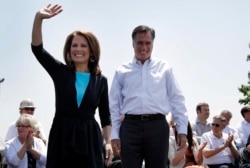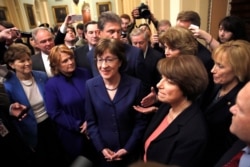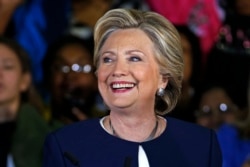It’s often an unspoken question on the campaign trail.
Are Americans ready to elect a woman president? After all, just over a decade ago, in 2008, a different barrier fell as voters propelled an African American man, Barack Obama, to the highest office in the land. Can a woman be far behind?
An average of national surveys in late January showed the most popular female Democratic presidential aspirant polling in third place with 15% support.
More sexist than racist?
"I think American voters tend to be more sexist than racist in that regard ,” says Michael Steele, who made history in 2002 by becoming the first African American elected to statewide office as lieutenant governor of Maryland.
"We saw with Barack Obama they chose the black man over the white woman,” he says, referring to the 2008 battle for the Democratic nomination waged between Obama and Hillary Clinton.
Clinton later went on to win the 2016 Democratic presidential nomination but lost to Donald Trump in the general election.
In the current presidential race, Democratic Sen. Elizabeth Warren of Massachusetts drew attention to gender bias in mid-January when she accused a rival candidate, Sen. Bernie Sanders of Vermont, of privately telling her that a woman could not win the presidency. Sanders denied the accusation during a nationally televised debate. But the spat between the two presidential contenders — who describe themselves as long-time friends and share many policy positions — underscored sensitivities about obstacles women face when running for the nation’s highest offices.
In the weeks since, Sanders has risen in most polls while Warren has fallen further behind.
Presidential stereotype
“There's such an entrenched stereotype in this country of what a successful presidential candidate looks like and that's because, for hundreds of years, it was a white man. And so there is really an imagination barrier with voters when it comes to electing women,” says Amanda Hunter, director of research and communications for the Barbara Lee Family Foundation, which works to ensure that women are equally represented in American politics.
Women who seek executive office often have to run dual campaigns — the public one to win over voters and a second push to convince donors and others that they actually can win, according to Hunter. Men are assumed to be qualified, while women have to prove that they’re qualified over and over again, she says, adding that women are treated differently than men when ethical issues arise.
“There is something called the ethical pedestal that we talk about,” Hunter says. “Women are presumed to be more moral and more honest than men, but if they are accused of lying or wrongdoing, it's a lot harder for them to climb back up on the pedestal if they fall.”
Some observers also believe women are judged more harshly on their physical appearance, the sound of their voice, or other factors out of their control.
Ariel Hill-Davis, founder and policy director for Republican Women for Progress, a group that supports GOP women who want to run for office, points to the lengths former Minnesota Republican Congresswoman Michelle Bachmann, once a conservative star, felt compelled go to in order to meet the public's expectations.
“When she was running her campaign, between every event, she had to shower and reset her hair and makeup and put herself back together in terms of her outfit,” Hill-Davis says. “Traditionally, on a campaign trail for men, what they do in between their events is that they practice and they prepare for the next event by going over things rather than just purely taking care of their physical being.”
Women must also moderate their tone, for fear people will perceive them as being too shrill or emotional. Both former Vice President Joe Biden and former South Bend, Indiana Mayor Pete Buttigieg have characterized Warren as angry and antagonistic. While anger can be seen as a powerful emotion for a man, women display it at their peril.
“Why aren't we juxtaposing Elizabeth Warren’s supposed anger against Bernie Sanders’ well-known, kind of fiery and angry demeanor?” Hill-Davis says, adding that Sanders’ famous grumpiness is seen as bold and authentic. “But when we flip that, and we have kind of a perception of anger on, for instance, Warren's part, it's purely tied to negative feelings.”
Winning elections
Warren confronted the question of female electability at the most recent Democratic presidential debate on Jan. 14.
She pointed out that she and Sen. Amy Klobuchar of Minnesota, the only women on the stage, were the only candidates in the group who’d never lost an election. The men on the stage have lost a total of 10 elections among them.
Recent research backs Warren up. For the most part, once women and people of color were on the ballot in 2018, they were just as likely to win their elections as white men, according to a June report.
Double standards?
In November, Klobuchar used Buttigeig, a Midwest mayor with no national political experience, as an example of how women are held to a different standard than men. She suggested that a woman with Mayor Pete’s qualifications probably would not make it to the debate stage.
However, former North Dakota Sen. Heidi Heitkamp, a Democrat, disagrees. Referring to Buttigieg as a talented politician who offers voters something different, she points to freshman New York Congresswoman Alexandria Ocasio-Cortez as evidence that women of limited experience can also draw national admiration.
“She basically is a huge political figure without a lot of background and political experience,” Heitkamp says. “You have to imagine what would be her position right now if she were in this race. Let's say Bernie [Sanders] wasn’t and that she was. I think she'd be taken seriously as a presidential candidate.”
Heitkamp does believe that women candidates deal with unconscious bias. She remembers being told that she didn’t “look like a governor” when she ran for her state’s top job in 2000. However, she believes people tend to overplay the gender factor when it comes to Hillary Clinton’s electoral college loss to Donald Trump in the 2016 presidential election.
"A lot of people would say that Secretary Clinton was just not the right person. She came with too much baggage. She was not an unknown,” Heitkamp says. “She transcended, in many ways, gender. She had her own persona. And so I think that we really don't know yet what a comparable woman candidate, what kind of bias or additional hurdles she would experience. But I think a lot of people want to find out.”
Breaking barriers
Michael Steele, who knows something about breaking barriers, believes Hillary Clinton came with so much “baggage” precisely because she was a woman.
“We want to pretend it's not true that we still have very puritanical views of women in this country,” says Steele, the first African American to chair the Republican National Committee. “She has played the game with the boys and she played at their level...so not only did they resent her, her politics, but they resent that she executed her politics as effectively as she did as a woman...How dare this woman challenge in this political space where men are there controlling actors and to do so successfully?”
A Quinnipiac University poll released this week suggests electability remains a challenge for Warren. While the senator gets high ratings when it comes to intelligence, only 7% of Democrats polled believe she has the best chance to defeat President Trump.
Given his own experience, what advice does Steele have for the women candidates trying to break the last glass ceiling?
"I think probably stay true to who you are...and you'll be surprised how quickly they move off of your race and your gender and move on to what's actually coming out of your mouth and what’s in your head and your heart,” he says. “So just be comfortable in your own skin and do your thing and people will see that and recognize it for what it is. Don't fall into the trap of being a woman before you are the person you are.”










